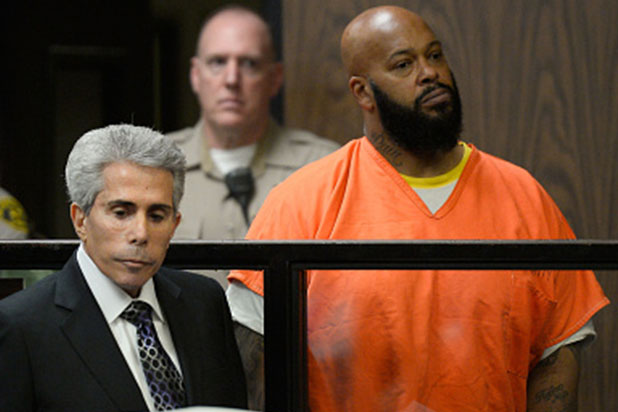
What Just Happened?
- ✨Prison Phone Bombshell: Suge Knight appeared on Chris Cuomo’s NewsNation show and accused his ex-attorney, David Kenner, of being linked to the assassination of Tupac Shakur.
- ⚡Kenner Under Fire Again: Kenner previously withdrew from Suge’s civil case and has faced disciplinary action, including a potential disbarment inquiry and a denied motion to exit another trial.
- 🌐Legal Shockwaves: The implications of Suge’s claims raise questions of defamation, attorney ethics, and even potential criminal exposure.
By Samuel Lopez – USA Herald
LOS ANGELES – The world of hip-hop and courtroom drama collided in spectacular fashion last night, as Death Row Records co-founder Marion “Suge” Knight phoned into the Chris Cuomo show on NewsNation from behind bars and dropped a live bombshell. Knight veered off-topic during a discussion on the Diddy trial to launch a jaw-dropping accusation against his former attorney, David Kenner.
“It just makes your blood boil,” Suge said, his voice crackling over the prison phone line. “I found out recently that allegedly one of my attorneys, David Kenner, was involved in the assassination of Tupac and me getting shot… and of witnesses… but that’s another story.”
While Knight left the explosive accusation dangling without elaboration, the damage was done. The statement was broadcast to a national audience, sparking immediate backlash and raising a host of ethical and legal questions.
The interview was meant to be a commentary on the Diddy trial, with Suge offering his perspective on the hip-hop mogul’s mounting legal woes. However, Knight quickly hijacked the segment, shifting the spotlight onto his personal legal history and turning the conversation into a platform to air old grievances.
Who Is David Kenner?
David Kenner is no stranger to controversy. Once seen as a legal bulldog for the stars, Kenner built his career representing celebrities entrenched in high-stakes criminal litigation. His work for Suge Knight during the height of Death Row Records’ dominance cemented his place in hip-hop legal lore.
However, his credibility has taken repeated hits in recent years. As previously reported by USA Herald, Kenner sought to withdraw from representing Knight in a civil wrongful death lawsuit just before trial — a move that Knight publicly criticized. Kenner’s exit from the case was eventually permitted, and Knight proceeded to settle the matter while representing himself pro se.
More recently, Kenner found himself embroiled in a legal entanglement of his own after a court denied his motion to withdraw from a retrial due to concerns over his competency and capacity to effectively represent Knight. Full Story Here
The Tupac Connection: Fueling Longstanding Theories
Knight’s accusation against Kenner feeds into one of the most enduring conspiracies in hip-hop history: the 1996 murder of Tupac Shakur. Tupac was fatally shot in a drive-by shooting in Las Vegas while riding in a BMW with Knight. Although numerous theories and suspects have been floated over the years — including law enforcement corruption, gang rivalry, and East Coast-West Coast rap feuds — no solid link has ever tied Kenner to the crime.
Until now.
Knight’s sudden allegation adds a new wrinkle to the case. While he qualified his remarks with “allegedly,” the impact was immediate and profound. Legal experts suggest that the charge, though unverified, could further strain Kenner’s professional standing, especially amid existing questions about his ethical fitness to practice law.
Legal Repercussions for Suge Knight
Despite being incarcerated, Knight’s words carry weight. A televised statement accusing someone of criminal conduct — especially a former attorney — could expose Knight to civil liability for defamation.
Under California law, defamation is defined as a false and unprivileged publication that injures a person’s reputation. Given that the statement was aired nationally and specifically named Kenner, all key elements of defamation could theoretically be met, especially if Kenner were to pursue damages on the grounds of malice and reputational harm.
But Knight’s use of the word “allegedly” complicates things. While it may offer a sliver of legal insulation, it does not automatically render the statement non-defamatory. Courts may still assess whether the statement was made with reckless disregard for the truth — a standard that public figures like Kenner would need to prove under the “actual malice” threshold established in New York Times Co. v. Sullivan.
Kenner’s Response?
So far, Kenner has remained publicly silent. But the legal world is buzzing about how he might respond.
Some speculate Kenner may seek to publicly deny the allegations while avoiding litigation, in part to sidestep the public disclosure of sensitive case files, client communications, or other material that could surface during discovery. Others believe he could strike back aggressively, using the accusation as a springboard for a countersuit to redeem his damaged reputation.
And then there are whispers in legal circles that Kenner’s alleged involvement in Knight’s affairs might not be as clean-cut as either party would like the public to believe. The line between zealous advocacy and ethical boundaries has always been blurry in cases involving powerful entertainment figures.
Where Does This Leave the Diddy Discussion?
Ironically, Knight’s detour overshadowed what was intended to be a segment focused on the growing legal scandal surrounding Sean “Diddy” Combs, who faces federal charges over sex trafficking, racketeering, and other allegations.
The Cuomo segment was meant to give Knight a platform to draw parallels between his own past and Diddy’s present. Instead, it became a platform for an entirely new controversy.
And in doing so, it raised questions not just about Diddy or Kenner or Suge himself — but about how deep, and how long, the culture of corruption, betrayal, and blurred legal lines has existed at the intersection of law and hip-hop.
Explore More
🔗 Follow us on X @RealUSAHerald


